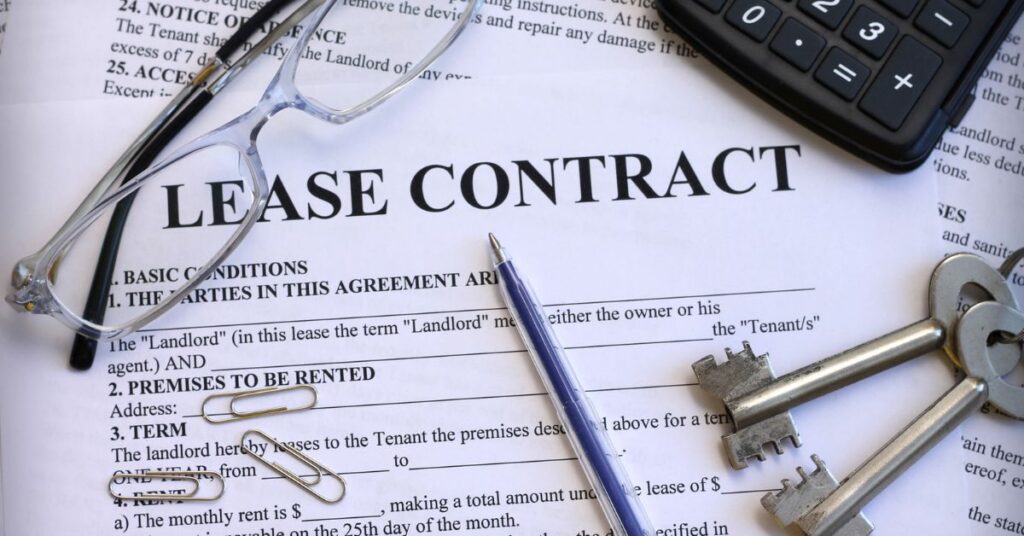As a tenant without a lease, you still have rights protected by law. In most states, including California and Georgia, you’re considered a tenant-at-will. This means you have the right to occupy the rental property with the landlord’s consent, and you’re protected by landlord-tenant laws, such as eviction and security deposit regulations.
In California, for instance, you’re entitled to a 30-day notice from the landlord before termination or changes to the rental agreement. Similarly, in Georgia, tenants-at-will must receive a 60-day notice for such actions.
These notices must be in writing to protect your rights. However, failing to pay rent can expedite the eviction process, with landlords having the option to file for possession immediately. Overall, despite the absence of a written lease, tenants without one still have rights under state laws to ensure fair treatment and protection in their rental arrangements.
Tenant Rights When Renting Without a Lease Agreement
Tenants renting without a lease agreement, often referred to as tenants-at-will, still possess fundamental rights safeguarded by landlord-tenant laws. Despite the absence of a formal lease, tenants have the right to occupy and utilize the rented premises as long as they comply with mutually agreed-upon restrictions.
states like California and Georgia, where specific regulations govern such arrangements, tenants-at-will enjoy protection against unjust eviction and arbitrary changes to rental agreements.
For instance, in California, landlords must provide tenants-at-will with a written notice of at least 30 days before terminating or modifying the rental agreement. Similarly, in Georgia, tenants are entitled to a 60-day notice period for such actions. These notices, crucial for safeguarding tenants’ rights, must be delivered in writing.
However, failure to fulfill rent obligations can expedite the eviction process, empowering landlords to pursue possession without the requisite notice period. Despite the absence of a formal lease, tenants without such agreements retain essential rights under state laws, ensuring fair treatment and legal protection in their rental relationships.
Right to Habitable Living Conditions

Even in the absence of a formal lease agreement, tenants have the right to expect habitable living conditions. This includes basic amenities such as functioning plumbing, heating, and a safe environment free from hazards.
Landlords are legally obligated to maintain the rental property in a condition that is fit for habitation. If issues arise that compromise these conditions, tenants have the right to request repairs, and landlords must address them promptly. Ensuring habitable living conditions is essential for safeguarding the well-being and rights of tenants renting without a lease agreement.
Right to Privacy
Tenants renting without a lease agreement still maintain the fundamental right to privacy within their rented premises. Landlords must respect this right by providing advance notice before entering the rental unit, except in cases of emergency or abandonment.
This notice period typically ranges from 24 to 48 hours and allows tenants to prepare for any visits by the landlord or their representatives. Protecting the privacy of tenants fosters a sense of security and autonomy in their living space, regardless of the absence of a formal lease agreement.
Right to Reasonable Notice Before Landlord Entry
Even in the absence of a formal lease agreement, tenants have the right to reasonable notice before their landlord enters the rented premises. This notice period, typically ranging from 24 to 48 hours, allows tenants to prepare for the visit and ensures their privacy and security.
Landlords must adhere to this requirement except in cases of emergency or abandonment. Respecting tenants’ right to reasonable notice fosters a harmonious landlord-tenant relationship and promotes a sense of autonomy and security within the rental property.
Right to Security Deposit Refund
Tenants renting without a lease agreement still retain the right to a security deposit refund. In the absence of a written lease, landlords must still adhere to state laws governing security deposits.
These laws typically require landlords to return the deposit, minus any legitimate deductions for damages or unpaid rent, within a specified timeframe after the tenant vacates the property. This right ensures that tenants are not unfairly deprived of their funds and encourages landlords to maintain the property in good condition throughout the tenancy.
Right to Notice Before Eviction
Tenants without a lease agreement have the right to receive notice before eviction proceedings begin. Even in the absence of a written lease, landlords must follow legal procedures to evict tenants, which typically involve providing a formal notice of eviction.
This notice informs the tenant of the landlord’s intention to terminate the tenancy and initiates the legal process for eviction. The notice period varies depending on local regulations but generally gives tenants sufficient time to address any issues or find alternative housing arrangements. This right protects tenants from sudden displacement and ensures that evictions occur through fair and transparent procedures.
Right to Defend Against Unlawful Eviction
Tenants without a lease agreement also have the right to defend against unlawful eviction. Even in the absence of a formal lease, landlords must adhere to the legal process for eviction outlined in local regulations. If a tenant believes that the eviction is unjust or unlawful, they have the right to challenge it in court.
This may involve presenting evidence to refute the landlord’s claims or demonstrating that proper eviction procedures were not followed. By exercising this right, tenants can seek legal recourse to prevent wrongful eviction and protect their right to secure housing.
Legal Framework for Lease-Less Tenancy

In the absence of a written lease agreement, tenants still operate within a legal framework that governs their tenancy. While the specifics may vary depending on local laws and regulations, several key principles typically apply to lease-less tenancy situations.
Implied Terms: In many jurisdictions, certain terms and conditions are implied into the landlord-tenant relationship even without a written lease. These may include the tenant’s right to occupy the premises peacefully, the landlord’s duty to maintain habitable living conditions, and the requirement for proper notice before changes to tenancy terms.
Notice Requirements: Both landlords and tenants usually have obligations to provide notice before making significant changes to the tenancy or terminating it. This includes notice periods for rent increases, termination of the tenancy, or entry into the rental property by the landlord.
Tenant Rights: Tenants typically retain fundamental rights regardless of the absence of a lease. These rights often include the right to privacy, the right to a habitable dwelling, the right to reasonable notice before landlord entry, and protections against discrimination or retaliatory eviction.
Landlord Obligations: Landlords still have legal responsibilities towards their tenants, such as maintaining the rental property in a habitable condition, ensuring essential services like water and electricity, and respecting tenants’ privacy rights.
Legal Recourse: In case of disputes or violations of tenant rights, lease-less tenants have legal recourse available to them. They may pursue legal action, file complaints with relevant housing authorities, or seek assistance from tenant advocacy organizations to enforce their rights.
Also read as: 3X RENT CALCULATOR: TAKE CONTROL OF YOUR BUDGET
Grasping the Legal Standing
In the absence of a formal lease agreement, tenants and landlords still operate within a legal framework that outlines their respective rights and responsibilities. This framework is essential for ensuring a fair and lawful tenancy arrangement, even without a written contract.
Protections Under Local Legislation
Under local legislation, tenants renting without a lease still benefit from various protections that safeguard their rights and ensure a fair tenancy arrangement. These protections are crucial in maintaining a balanced relationship between landlords and tenants, even in the absence of a formal agreement.
Key protections under local legislation often include the right to habitable living conditions, which mandates landlords to maintain the rental property in a safe and sanitary state. Additionally, tenants typically have the right to privacy, meaning landlords cannot enter the rented premises without proper notice except in emergencies.
Furthermore, local laws often stipulate the procedures for eviction, ensuring that tenants receive adequate notice and have the opportunity to defend themselves against wrongful eviction attempts. Additionally, tenants may be entitled to the return of their security deposit at the end of the tenancy, subject to certain conditions outlined in the law.
These protections serve to uphold tenants’ rights and prevent abuses by landlords, fostering a more equitable rental environment. Understanding and asserting these rights is essential for tenants renting without a lease to ensure they are treated fairly and legally by their landlords.
Exploring Regional Tenant Laws
Exploring regional tenant laws is crucial for renters, especially those without a formal lease agreement, as it provides insight into their rights and protections under local legislation. These laws vary by region but commonly encompass fundamental aspects such as habitable living conditions, privacy rights, and eviction procedures.
In many regions, tenants have the right to expect habitable living conditions, which include basic amenities like functioning utilities, proper sanitation, and structural integrity. Landlords are typically obligated to maintain these standards throughout the tenancy, regardless of the presence of a lease.
Eviction procedures outlined in regional laws often dictate the process landlords must follow to terminate a tenancy, including providing advance notice and adhering to specific legal requirements. Tenants without a lease are typically entitled to the same eviction protections as those with formal agreements.
By exploring regional tenant laws, renters can gain a comprehensive understanding of their rights and responsibilities, empowering them to advocate for fair treatment and seek recourse in case of disputes with their landlords.
Establishing Terms Without a Formal Lease

Establishing terms without a formal lease is common in rental agreements, especially in situations where tenants are considered tenants-at-will. Despite the absence of a written contract, certain terms and conditions are typically implied or agreed upon verbally between the landlord and tenant.
These terms often revolve around fundamental aspects such as rent payment, duration of the tenancy, and maintenance responsibilities. While they may not be explicitly outlined in a lease document, they form the basis of the rental agreement and are legally binding.
Rent payment arrangements, including the amount due, the frequency of payments, and accepted methods of payment, are usually agreed upon verbally or through past practices. Similarly, the duration of the tenancy, whether month-to-month or for a specific period, is often established through mutual understanding.
Maintenance responsibilities may include obligations for both the landlord and tenant regarding property upkeep, repairs, and utility payments. While specific details may vary depending on the situation, these responsibilities are generally governed by local landlord-tenant laws and customs.
Although establishing terms without a formal lease may seem informal, both parties need to have a clear understanding of their rights and obligations. This can help prevent misunderstandings and conflicts down the line, ensuring a smoother landlord-tenant relationship.
Defining Tenancy Agreements
| Aspect | Description |
| Identification of Parties | Clearly identify the landlord (property owner) and the tenant(s) renting the property. |
| Property Description | Provide a detailed description of the rental property, including its address, unit number, and features. |
| Term of Tenancy | Specify the duration of the rental period, whether it’s a fixed-term lease or a month-to-month agreement. |
| Rent Amount and Payment | Outline the rent amount, due date, acceptable payment methods, and any late fees or penalties. |
| Security Deposit | State the security deposit amount, conditions for its return, and any deductions for damages. |
| Utilities and Services | Clarify which utilities and services are included in the rent and which ones the tenant is responsible for. |
| Maintenance and Repairs | Define responsibilities for property maintenance, repairs, and procedures for reporting issues. |
| Use of Property | Specify any restrictions on the use of the rental property, such as subletting or business operations. |
| Entry and Inspection | Establish guidelines for landlord entry, including advance notice requirements for maintenance or inspections. |
| Termination and Renewal | Detail procedures for terminating the tenancy, giving notice to vacate, and options for renewal. |
Addressing Disputes and Resolutions
Addressing disputes and resolutions is a critical aspect of maintaining a healthy landlord-tenant relationship. Clear procedures should be established within the tenancy agreement to guide both parties in resolving conflicts amicably. These procedures may include steps for dispute resolution, such as mediation or arbitration, before considering legal action.
However, the agreement should outline the circumstances constituting a breach of contract and the corresponding remedies. Eviction procedures, including notice periods and legal requirements, should also be clearly defined. By incorporating these provisions into the tenancy agreement, both landlords and tenants can navigate disputes effectively, fostering a positive and cooperative living environment.
Resolving Conflict in Lease-Less Tenancies
- Open communication fosters understanding and resolution of conflicts.
- Understanding legal rights and responsibilities aids in conflict resolution.
- Negotiation allows for amicable resolution of disputes.
- Mediation or arbitration offers alternative avenues for resolving conflicts.
- Cooperation and compromise are key to finding mutually acceptable solutions.
- Positive relationships between tenants and landlords facilitate effective conflict resolution.
- Seeking legal advice can provide clarity and guidance in resolving disputes.
- Documenting agreements and communications helps prevent misunderstandings.
- Seeking common ground and focusing on shared interests can lead to resolution.
- Acknowledging concerns and showing empathy can defuse tense situations.
- Exploring creative solutions can help break deadlocks in conflict resolution.
- Engaging in respectful dialogue promotes constructive problem-solving.
Safeguarding Tenant Interests
Safeguarding tenant interests is essential in lease-less tenancies. First and foremost, ensuring habitable living conditions is paramount for tenant well-being. Respecting tenant privacy rights fosters a sense of security and comfort while providing reasonable notice before landlord entry preserves tenant autonomy.
However, refunding security deposits promptly maintains trust and fairness. Granting proper notice before eviction affords tenants time to plan and respond, upholding their rights to defend against unlawful eviction. Establishing a legal framework for lease-less tenancy clarifies rights and obligations, offering protections under local legislation reinforces tenant rights and ensures fairness.
Exploring regional tenant laws provides a comprehensive understanding and compliance while defining tenancy agreements clearly outlines expectations for both parties. Resolving conflicts in lease-less tenancies requires open communication and negotiation, with addressing disputes and resolutions through mediation or arbitration to prevent escalation.
Ensuring Fair Treatment in the Absence of Lease Agreement
Ensuring fair treatment in the absence of a lease agreement is crucial. Tenants have the right to habitable living conditions, privacy, and reasonable notice before landlord entry. Prompt refunding of security deposits and proper notice before eviction are essential for maintaining fairness.
Understanding the legal framework for lease-less tenancy and exploring regional tenant laws can protect tenant interests. Defining tenancy agreements and addressing disputes through mediation or arbitration contribute to fair treatment and harmonious landlord-tenant relationships.
Implications of Lease Absence on Rights
| Tenant Rights and Implications | Description |
| Right to Habitability | Tenants have the right to a safe and habitable living environment, even without a formal lease agreement. Landlords must maintain the property in a livable condition. |
| Right to Privacy | Tenants are entitled to privacy in their rented space. Landlords cannot enter the premises without proper notice or without a valid reason. |
| Right to Reasonable Notice | Landlords must provide reasonable notice before entering the rental property for inspections, repairs, or other purposes. |
| Security Deposit Refund | Tenants may still be entitled to the refund of their security deposit at the end of the tenancy, subject to deductions for damages beyond normal wear and tear. |
| Notice Before Eviction | Even without a lease, tenants must receive proper notice before eviction proceedings can begin. The notice period varies by jurisdiction. |
| Defense Against Unlawful Eviction | Tenants have the right to defend themselves against unlawful eviction attempts by landlords, such as illegal lockouts or utility shutoffs. |
| Resolving Disputes | Disputes between tenants and landlords can be resolved through negotiation, mediation, or legal action if necessary. |
| Safeguarding Tenant Interests | Tenants should take proactive steps to safeguard their interests, such as documenting communications and maintaining records of rent payments. |
| Ensuring Fair Treatment | Both landlords and tenants should adhere to fair and reasonable practices, even in the absence of a formal lease agreement. |
| Implications on Rights | The absence of a lease agreement may lead to uncertainty regarding terms and responsibilities, highlighting the importance of clear communication and understanding between parties. |
| Legal Framework | Tenants should familiarize themselves with local landlord-tenant laws to understand their rights and obligations in lease-less tenancies. |
Analyzing Tenant Entitlements Without Formal Documentation
In the absence of a formal lease agreement, tenants retain fundamental entitlements and protections under local tenancy laws, ensuring their rights are safeguarded despite the lack of written documentation. These entitlements encompass various aspects of the landlord-tenant relationship, including the right to habitability, privacy, and reasonable notice for entry.
However, tenants are entitled to a refund of their security deposit upon the termination of the tenancy, subject to deductions for damages. Should eviction become a concern, tenants have the right to receive proper notice and defend against any unlawful attempts. Disputes can be addressed through negotiation or legal avenues, underscoring the importance of understanding local legislation to navigate lease-less tenancies effectively.
Frequently asked questions
What are my rights as a tenant without a lease?
Tenants without a lease still have rights protected by local landlord-tenant laws.
Do I have the right to habitable living conditions without a lease?
Yes, tenants are entitled to safe and habitable living conditions regardless of a lease.
Can I expect privacy as a tenant without a lease?
Tenants have the right to privacy in their rented space, even without a formal lease agreement.
Do I need to be given notice before my landlord enters the property?
Yes, landlords must provide reasonable notice before entering a tenant’s rented premises.
Am I entitled to a refund of my security deposit if I don’t have a lease?
Yes, tenants are generally entitled to the refund of their security deposit, minus any deductions for damages.
What if my landlord tries to evict me without a lease?
Tenants still have the right to receive proper notice and defend against unlawful eviction attempts.
Can I address disputes with my landlord without a lease?
Yes, disputes can be resolved through negotiation or legal means, regardless of the presence of a formal lease agreement.
Final thought
In conclusion, while the absence of a lease may seem daunting, tenants without formal agreements can rest assured knowing that they still retain crucial rights and protections under the law. These rights serve as pillars of stability, ensuring that tenants can enjoy a safe and secure living environment, even in the absence of contractual documentation.
As such, the recognition and enforcement of these rights underscore the commitment to uphold fairness and equity in landlord-tenant relationships, irrespective of the presence of a formal lease.

James, with 5 years of business experience, brings expertise to our website. His profile reflects a commitment to excellence and innovation in his field.







